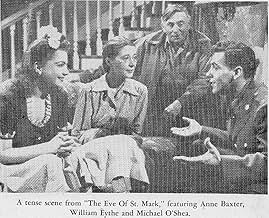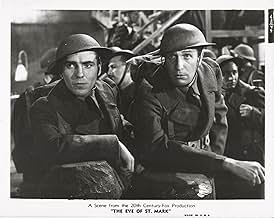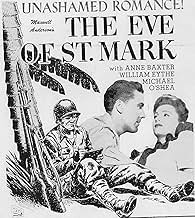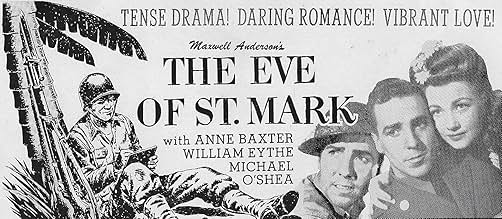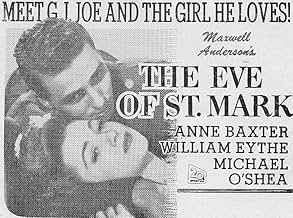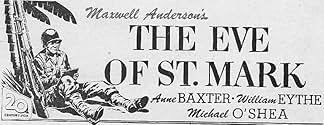Füge eine Handlung in deiner Sprache hinzuHometown boy Quizz West (William Eythe) is one of fewer than 19,000 draftees in 1940. After being familiarized with his fiancée Janet and him, we find Quizz at a gun position fighting off th... Alles lesenHometown boy Quizz West (William Eythe) is one of fewer than 19,000 draftees in 1940. After being familiarized with his fiancée Janet and him, we find Quizz at a gun position fighting off the Japanese along the Philippine shoreline. The situation becomes hopeless for Quizz and hi... Alles lesenHometown boy Quizz West (William Eythe) is one of fewer than 19,000 draftees in 1940. After being familiarized with his fiancée Janet and him, we find Quizz at a gun position fighting off the Japanese along the Philippine shoreline. The situation becomes hopeless for Quizz and his fellow gunners and it's either flee or hold their positions and provide cover for escape... Alles lesen
- Regie
- Drehbuch
- Hauptbesetzung
- Auszeichnungen
- 1 wins total
- Pvt. Shevlin
- (as Henry Morgan)
- Soldier
- (Nicht genannt)
- Medical Officer
- (Nicht genannt)
Empfohlene Bewertungen
William Eythe, one of Hollywood's blandest leading men - whose faltering career would drive him to alcoholic despair and an early grave - fails to grab our attention or empathy as a farm boy who finds himself battling with the Japs on some Philippine island. Although he's listed as the leading man, the status is nominal, and he finds himself struggling to stand out amongst an ensemble cast that includes the likes of Harry Morgan and Vincent Price. Morgan is the voice of doubt in the unit, who looks to the past when forming an opinion instead of acting for the future of the next generation; Price is an impoverished Southern aristocrat type, given to quoting Shakespeare at the drop of a hat; it's an eye-catching performance, although not, perhaps, for the right reasons. His southern accent is so weak it barely manages to crawl from his mouth before tripping from his lips with a dull thud.
The story plays second fiddle to the morale-boosting philosophising of its characters, and too much talk means the pace drags badly. In the final reel, the propaganda is ladled on like a thick creamy soup with characters speaking lines that must have had the audience squirming even back then. Essentially, the final message is a call to the parents of the nation to pass the baton to the next generation and allow all their fuzzy-cheeked boys to place themselves in the firing line.
Of course, the film was intended as a morale-booster but, thankfully, the propaganda element (usually abetted by racist jibes) is kept at bay here; on the contrary, it strives to depict the characters as normal human beings who are thrust into extraordinary and often painful situations. Still, the expected doses of comedy (supplied by O'Shea) and romance (not only does country-boy Eythe become engaged to neighbor Baxter, but the whole gang gets to entertain a couple of lonely bar-room girls once in uniform) are present and accounted for; incidentally, it is odd seeing Price (looking quite youthful and serving as the butt of his buddies' jokes for his cerebral superiority being offset by perennial pennilessness!) amid this environment.
The last act involves the war action proper, and even this is largely taken up by two of the men (Price included)'s bouts with malaria; the finale, then, sees the squad who had been cornered in a cave effect a fortuitous escape by sea (apparently, the ending of the original play was more downbeat) followed by the voluntary conscription of Eythe's younger brother. By the way, the title is a reference to an obscure Catholic feast where, it is said, that one can see the figures of those about to die upon entering a church(!) – hence making for an ideal wartime metaphor.
The cast of characters are a block of defaults from every war movie ever created. Only the over dramatized, over the top performance of the hugely over written script really lower this into a cinema play of the worst kind.
The scenes in the nightclub when Vincent Price quotes Shakespeare are just dreadful.
First victim of war is Vincent Price's accent. But the time they are going to war he's lost his Southern drawl! Amazingly, the C.O. in Mash turns up when he's in his 20's and HE SOUNDS THE SAME! It's amazing.
Is it worth watching, well... if there's nothing better on. Otherwise, give it a miss.
The first oddity is that Quizz and Janet grew up together as neighbors, but he never gave her a second thought. Until, that is, he just met her in the city. Now they are deeply in love when he heads out for artillery school and then for San Francisco for overseas assignment. It was pretty clear that his unit would be going to the Hawaiian Islands. But that early draft was for just one year, and it was October 1940 when he was drafted. So, he either reenlisted or was extended and may have found himself in Hawaii at the time the Japanese bombed Pearl Harbor on Dec. 7, 1941.
The combat sequence of the film was unusual for a war movie. It didn't show ground fighting, shore landings, or front line combat. Rather, Quizz was in an artillery battery. He was located on an island among many that the Japanese were attacking. So, Quizz's big gun was shelling Japanese troop boats in the distance as they were heading to invade another island .
The last oddity was Quizz dreaming of talking with his mom and with Janet about what his gun crew should do. Should they stay and try to knock out as many Japanese boats as possible to hinder their invasion? Or, should they withdraw and try to save themselves before capture? The final outcome is hinted at and partly solved the question for them. Japanese planes strafed their position and knocked out their big gun.
The movie was based on a 1942 play that ran for two years on Broadway. The scenes and camera work had the feel of the stage or filming in close quarters.
Wusstest du schon
- WissenswertesAccording to his daughter, Victoria, The Eve of St. Mark (1944) was one of Vincent Price's personal favorites of his film performances.
- Zitate
Sgt. Kriven: There's no such thing as a touch of Malaria. It's like a touch of garlic, a little bit goes a long way.
- VerbindungenEdited into All This and World War II (1976)
Top-Auswahl
Details
- Erscheinungsdatum
- Herkunftsland
- Sprache
- Auch bekannt als
- Maxwell Anderson's The Eve of St. Mark
- Drehorte
- Produktionsfirma
- Weitere beteiligte Unternehmen bei IMDbPro anzeigen
- Laufzeit1 Stunde 36 Minuten
- Farbe
- Seitenverhältnis
- 1.37 : 1
Zu dieser Seite beitragen


